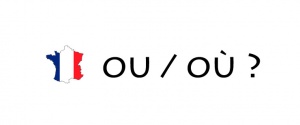Difference between revisions of "Language/French/Grammar/When-use-ou-or-où"
| Line 2: | Line 2: | ||
<div class="pg_page_title">How to know when to use "où" and "ou"?</div> | <div class="pg_page_title">How to know when to use "où" and "ou"?</div> | ||
[[File:ou-où.jpg|thumb]] | [[File:ou-où.jpg|thumb]] | ||
Welcome to the lesson on the use of "ou" and "où" in French grammar. In French, "ou" and "où" are two different conjunctions that are used to express different meanings. Understanding the difference between these two words is essential for speaking and writing accurate French. | |||
==Summary== | ==Summary== | ||
| Line 17: | Line 15: | ||
==ou== | ==ou== | ||
"Ou" is a conjunction that is used to connect two or more alternatives. It is equivalent to the English word "or". It expresses a choice between one or more things and is used in an affirmative sentence. | |||
It can be replaced by "ou bien" (or, else). | It can be replaced by "ou bien" (or, else). | ||
*Example: Je veux du fromage '''ou''' rien du tout. (I want some cheese or nothing) ➡ Je veux du fromage <span style="color:green;">'''ou bien'''</span> rien du tout (I want some cheese, or else, nothing). | *Example: Je veux du fromage '''ou''' rien du tout. (I want some cheese or nothing) ➡ Je veux du fromage <span style="color:green;">'''ou bien'''</span> rien du tout (I want some cheese, or else, nothing). | ||
*Je veux prendre un café ou un thé. (I want to have a coffee or a tea). | |||
==où== | ==où== | ||
"Où" is an interrogative adverb, or subordinating relative pronoun that is used to ask a question about a location or to express a place. It is equivalent to the English word "where". | |||
It's an interrogative adverb in | It's an interrogative adverb in | ||
| Line 35: | Line 35: | ||
==Video== | ==Video== | ||
<youtube>hcJZYtP_gww</youtube> | <youtube>hcJZYtP_gww</youtube> | ||
In conclusion, the difference between "ou" and "où" is an important aspect of French grammar that must be understood to communicate effectively in the language. Remember to use "ou" when connecting alternatives and "où" when asking a question about a location or expressing a place. | |||
I hope this lesson has been helpful in clarifying the use of "ou" and "où" in French grammar. Keep practicing and you will master this important aspect of the language in no time! | |||
Revision as of 22:54, 8 February 2023
| When use: Quand or Quant? | Ou or Où? | a or à? |
Welcome to the lesson on the use of "ou" and "où" in French grammar. In French, "ou" and "où" are two different conjunctions that are used to express different meanings. Understanding the difference between these two words is essential for speaking and writing accurate French.
Summary
It's easy! :)
- OU = OR
- OÙ = WHERE
NB: "OU" and "OÙ" have exactly the same pronunciation.
ou
"Ou" is a conjunction that is used to connect two or more alternatives. It is equivalent to the English word "or". It expresses a choice between one or more things and is used in an affirmative sentence.
It can be replaced by "ou bien" (or, else).
- Example: Je veux du fromage ou rien du tout. (I want some cheese or nothing) ➡ Je veux du fromage ou bien rien du tout (I want some cheese, or else, nothing).
- Je veux prendre un café ou un thé. (I want to have a coffee or a tea).
où
"Où" is an interrogative adverb, or subordinating relative pronoun that is used to ask a question about a location or to express a place. It is equivalent to the English word "where".
It's an interrogative adverb in
- direct interrogative sentence: « Où allons-nous ? (Where are we going?)
- or Indirect « Je te demande où nous allons » (I ask you where we're going).
You can not replace by "ou bien".
Video
In conclusion, the difference between "ou" and "où" is an important aspect of French grammar that must be understood to communicate effectively in the language. Remember to use "ou" when connecting alternatives and "où" when asking a question about a location or expressing a place.
I hope this lesson has been helpful in clarifying the use of "ou" and "où" in French grammar. Keep practicing and you will master this important aspect of the language in no time!
